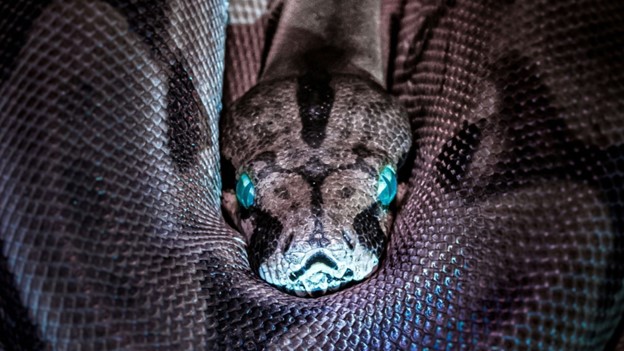

Brax Carvette, Youth Minister
Brax is the youth pastor at NorthRidge Fellowship and has been at NorthRidge since 2006. He and his wife, Jessica, have a son, two daughers and they live in Elk River, Minnesota.
The book of Exodus begins in the midst of a long war that has been waging since Genesis 3. In its opening section, we learn of our enemy’s tactics—and God’s power.
Ever since the fall of humanity in Genesis 3, human beings and the Snake have been at war with one another (see Genesis 3:15). We can feel this war go on even today. We suffer. We struggle. We die. All of this goes on because of the war in our world. The people of Israel felt this too.
Egypt had been a place of refuge for them during a huge famine back in Genesis (starting in chapter 21). Soon, the 70 people that found food and shelter in Egypt during Joseph’s day multiplied and grew into a huge community within this nation (see Exodus 1:1–7). They were “fruitful and multiplied” (v. 7) in the land of Egypt— echoing language that God used when he blessed Adam and Eve in Genesis 1:28 and promised Abraham when he said he would make his descendants as numerous as the stars in the heavens (see Genesis 12:2, 15:5, and 35:11 to Jacob).
But, just as in the early parts of Genesis, things didn’t stay fruitful and prosperous for long. A new king of Egypt comes to power (possibly through military strength) and sees Israel as a threat. He tells his Egyptian subjects, “Let us deal shrewdly with them…” (Exodus 1:10) If you’ve ever seen The Prince of Egypt or any movie with a Pharaoh in it, you’ll recall that there’s a certain slithering animal on the crown of the Pharaohs. That’s right, a snake. And now, this snake-king is telling his people that they need to deal shrewdly with God’s people. Does this sound familiar to anyone else? It’s the snake in the Garden of Eden all over again (Genesis 3:1)! The offspring of the snake and the offspring of the woman (Eve) are about to go to war.
The snake makes the first move, putting the Israelite people under heavy burdens, making them work to the bone. Why would he try this method? Because he knows that work can be a cause of much suffering. He remembers God’s words to Adam when he said, “Cursed is the ground because of you; through painful toil you will eat food from it all the days of your life. It will produce thorns and thistles for you, and you will eat the plants of the field. By the sweat of your brow you will eat your food until you return to the ground, since from it you were taken; for dust you are and to dust you will return” (Genesis 3:17–19). The field being the exact place that the snake-king sends the Israelites to work). So, the snake forces them to work under a weight too great for them to bear in the hopes that it will crush them— that it will make them return to the dust of the ground. But God remains true to his promise to make Abraham’s descendants as many as the sand on the seashore. The snake’s plan doesn’t work.
When that fails, the snake slithers into the fragility and intimacy of a woman and her unborn child. “The curse of Adam didn’t work,” the old reptile may have thought, “let’s try the curse of Eve” (see Genesis 3:16). He demands that the Hebrew midwives, Shiphrah and Puah, to kill any baby boys that are born to the Israelite women. But they are brave women. They are like Eve in glory rather than Eve in fallenness. They take the weapon of deceit that the snake uses against God’s people and twist it out of his hands. They act more shrewdly than the snake and deceive him. The last time that there was a snake, lying, and a woman involved, it ended in curses. This time, it ends with the women being blessed! God blesses Shiphrah and Puah with families because they feared God and didn’t listen to the voice of the snake (Exodus 1:21). His plan doesn’t work.
So, the snake pulls out all the stops. He tells his brood of vipers to kill any Hebrew baby boys by throwing them into the Nile River (see Exodus 1:22). In the face of state-sanctioned, citizen-supplied genocide, what can God do? It all seems hopeless.
We can have that same sense in our day-to-day lives. The snake does not want us to be fruitful. He wants to keep us from bearing the fruit of the Spirit: love, joy, peace, patience, kindness, faithfulness, gentleness, and self-control (Galatians 5:22–23). The snake goes after us at our workplace, trying to keep us from being fruitful. The snake goes after us and our families, trying to keep us from being fruitful there. In these two places of critical importance (work and family) he does not want the Spirit’s work to change lives. He does not want the gospel of Jesus Christ to go forward and have its effect in us and the people around us. Yet God is faithful.
Sometimes, in the midst of wars and rumors of wars, of election seasons, of AI and powerful tech giants, life can feel hopeless. It can feel like we are losing. It can feel like God and his promises are losing. What can God do in our situation today? Well, let’s look at what he did back then. After this genocidal decree goes out, a woman has a baby boy. She looks and sees that he is good (Exodus 2:2). She’s not like Eve back in the Garden— looking and seeing that the fruit was good for food (Genesis 3:6 is the same language as Exodus 2:2). She sees that her offspring is good. This baby boy was someone special and she saw it. She sees that God’s deliverance is good.
So, she does what no mother should ever have to do: she chooses to put her child into the waters of death (Exodus 2:3). That’s what the ancient imagination viewed water to be: a place of chaos and death. And in the story of Exodus, the Nile is even more pronounced as a place of death because it was the method of death for all Hebrew baby boys.
But out of this place of death came life from an unlikely hand: the daughter of Pharaoh (Exodus 2:5–10). There are valiant daughters of Eve even in the snake’s own household! She saves Moses’ life and raises him as her own. She does all of this right under the snake’s nose. The snake let the seed of his own destruction grow up in his living room! That’s what God can do when things seem hopeless. He can send a messiah to be raised up right in front of the snake and he can’t do a thing to stop it!
So, if you’re feeling hopeless this week, take heart. God can work deliverance for you even in the darkest pit that the snake has dug for you— and the old reptile can’t do a thing. But we must join Moses’ mother and God our Father in this deliverance by being willing to give up what is most precious to us for the sake of redemption and freedom. Moses’ mom gave up her precious baby boy to the waters of death, trusting in God to bring about life. God our Father sent his Son to go through the waters of death to bring about deliverance. We cannot go to war with the snake if we refuse to go through those waters ourselves. It’s through those waters that God brings about the most fruit in our lives.
It can be scary to offer such a sacrifice to God. But listen to what the prophet Isaiah says as you go about your week:
But now, this is what the Lord says—he who created you, Jacob, he who formed you, Israel:
“Do not fear, for I have redeemed you; I have summoned you by name; you are mine.
When you pass through the waters, I will be with you; and when you pass through the rivers, they will not sweep over you.
When you walk through the fire, you will not be burned; the flames will not set you ablaze.
For I am the Lord your God, the Holy One of Israel, your Savior; I give Egypt for your ransom, Cush and Seba in your stead.
Since you are precious and honored in my sight, and because I love you, I will give people in exchange for you, nations in exchange for your life.
Do not be afraid, for I am with you; I will bring your children from the east and gather you from the west.
I will say to the north, ‘Give them up!’ and to the south, ‘Do not hold them back.’
Bring my sons from afar and my daughters from the ends of the earth—everyone who is called by my name, whom I created for my glory, whom I formed and made.”
–Isaiah 43:1–7


Contact Us
If you have questions about an article you read on our blog, reach out to Brax Carvette, Blog Editor at braxc@nrf.life or call 763.270.6425.
Share our Blog on Facebook!











